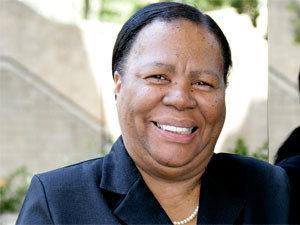
The Department of Science and Technology (DST) will use a significant portion of its 2017/18 budget to develop human capital and modernise research infrastructure.
This was revealed by science and technology minister Naledi Pandor yesterday, when she tabled the department's Budget Vote.
The budget was divided between the department's five main programmes: research development and support (R 4.3 billion); socio-economic innovation partnerships (R1.6 billion); technology innovation (R1.1 billion); international co-operation and resources (R128.7 million); and administration (R383.7 million).
"Science, technology and innovation are key to equitable economic growth, underpinning economic advances and improvements in health systems, education and infrastructure," she said.
Pandor said internationally, science, technology and related innovations are recognised as future sources of economic growth, with the potential to create new types of jobs, and provide new solutions to problems trapping people in poverty, such as poor health and water shortages.
She said her department has sharpened its focus on the ways in which its work and the work of the broader national system of innovation can contribute to addressing SA's most pressing challenges.
Several state-owned companies under the DST were allocated their budgets accordingly. "It is responsible for the overall management of the department and to ensure organisations funded by the DST comply with the standards of good corporate governance and align their activities with the strategic focus of the national system of innovation," Pandor said.
The National Research Foundation, which supports and promotes research through the funding of human resource development and the provision of facilities to enable the creation of knowledge, innovation and development, received R926 million.
Research institute the Council for Scientific and Industrial Research was allocated R916 million to foster industrial and scientific development, particularly through multidisciplinary research and technological development, either by itself or in cooperation with public and private sector institutions.
The Human Sciences Research Council got a R305 million share to undertake, promote and coordinate policy-relevant, problem-oriented research in the human and social sciences, including research projects for public sector users, non-governmental organisations and international development agencies in partnership with researchers all over the world, but particularly in Africa.
The Technology Innovation Agency got R397 million to stimulate and intensify technological innovation to improve economic growth and the quality of life of all South Africans.
"The agency is key to ensuring the translation of the research and development outcomes of higher education institutions, science councils and public entities into commercial technology products and services, thus intensifying the impact of innovation on the economy and society," said Pandor.
The Academy of Science of South Africa (R25 million) comprises an assembly of scholars from many disciplines who network both nationally and internationally.
The South African National Space Agency was given R131 million to promote the use of space and cooperation in space-related activities, while fostering research in space science, advancing scientific engineering through developing human capital, and providing support to industrial development in space technologies.
Share